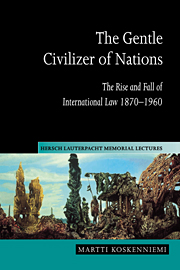Book contents
- Frontmatter
- Contents
- Preface
- List of abbreviations
- Introduction
- 1 “The legal conscience of the civilized world”
- 2 Sovereignty: a gift of civilization: international lawyers and imperialism, 1870–1914
- 3 International law as philosophy: Germany 1871–1933
- 4 International law as sociology: French “solidarism” 1871–1950
- 5 Lauterpacht: the Victorian tradition in international law
- 6 Out of Europe: Carl Schmitt, Hans Morgenthau, and the turn to “international relations”
- Epilogue
- Bibliography
- Index
1 - “The legal conscience of the civilized world”
Published online by Cambridge University Press: 06 July 2009
- Frontmatter
- Contents
- Preface
- List of abbreviations
- Introduction
- 1 “The legal conscience of the civilized world”
- 2 Sovereignty: a gift of civilization: international lawyers and imperialism, 1870–1914
- 3 International law as philosophy: Germany 1871–1933
- 4 International law as sociology: French “solidarism” 1871–1950
- 5 Lauterpacht: the Victorian tradition in international law
- 6 Out of Europe: Carl Schmitt, Hans Morgenthau, and the turn to “international relations”
- Epilogue
- Bibliography
- Index
Summary
Man in his conscience is no longer bound by the ends of particularity. This is the higher standpoint, the standpoint of the modern world. We have now arrived at the stage of consciousness, which involves a recoil upon itself. Earlier ages were more sensuous, and had before them something external and given, whether it was religion or law. But conscience is aware of itself as thought, and knows that my thought is for me the only thing that is binding.
G. W. F. Hegel, Philosophy of Right, § 136. Addition.An observer of international politics in the 1860s with liberal sympathies could not fail to be disturbed about the apparent coincidence of two facts. The preceding half-century had constituted one of the longest periods of peace in European history, punctured only by occasional and limited military conflict in the margins. The long calm had created conditions for an unprecedented economic growth whose fruit may have been unevenly distributed but seemed tangible enough as proof that European civilization had been launched on an irreversible march towards economic and spiritual progress.
On the other hand, peace had been created and enforced through a pact among five Great Powers, three of which (Austria, Prussia, and Russia) were governed by absolutist monarchs whose main motive for co-operation seemed to be their shared wish to curb any proposal for representative government or increased franchise.
- Type
- Chapter
- Information
- The Gentle Civilizer of NationsThe Rise and Fall of International Law 1870–1960, pp. 11 - 97Publisher: Cambridge University PressPrint publication year: 2001
- 4
- Cited by

